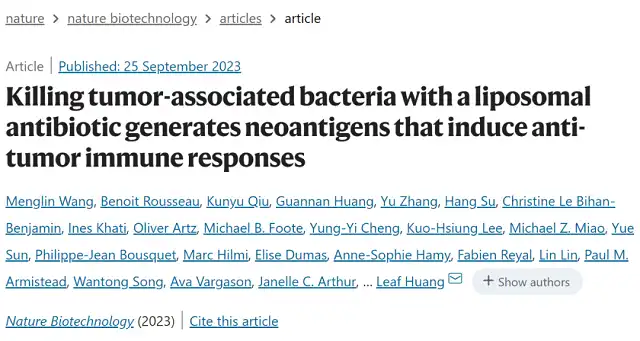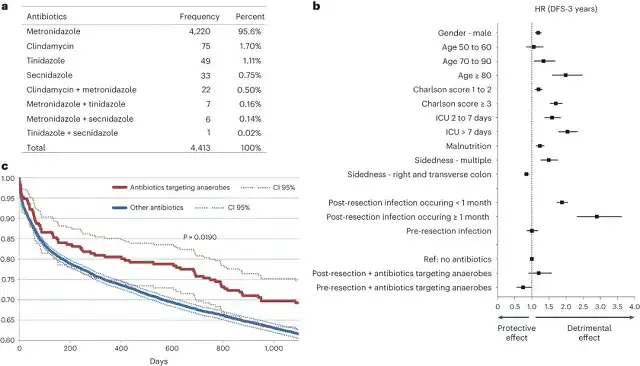No need for regular esophageal cancer screening in patients with non-erosive GERD
- Normal Liver Cells Found to Promote Cancer Metastasis to the Liver
- Nearly 80% Complete Remission: Breakthrough in ADC Anti-Tumor Treatment
- Vaccination Against Common Diseases May Prevent Dementia!
- New Alzheimer’s Disease (AD) Diagnosis and Staging Criteria
- Breakthrough in Alzheimer’s Disease: New Nasal Spray Halts Cognitive Decline by Targeting Toxic Protein
- Can the Tap Water at the Paris Olympics be Drunk Directly?
No need for regular esophageal cancer screening in patients with non-erosive GERD
- Should China be held legally responsible for the US’s $18 trillion COVID losses?
- CT Radiation Exposure Linked to Blood Cancer in Children and Adolescents
- FDA has mandated a top-level black box warning for all marketed CAR-T therapies
- Can people with high blood pressure eat peanuts?
- What is the difference between dopamine and dobutamine?
- How long can the patient live after heart stent surgery?
No need for regular esophageal cancer screening in patients with non-erosive GERD.
BMJ: Data from nearly 490,000 people show that the incidence of esophageal adenocarcinoma in patients with non-erosive gastroesophageal reflux disease is similar to that of the general population, and no regular screening for esophageal cancer is required.
Gastroesophageal reflux disease (GERD) is a common clinical condition, mainly caused by the reflux of gastric and duodenal contents to the esophagus and extra-esophageal sites, resulting in a series of clinical syndromes. Heartburn and reflux are typical symptoms of GERD.
GERD can be divided into three types according to whether the reflux will cause esophageal mucosal erosion: non-erosive gastroesophageal reflux disease (NERD), reflux esophagitis (RE, also called erosive esophagitis) and Barrett’s esophagus (BE).
Unlike RE and BE, which are often considered as precancerous lesions of esophageal cancer, NERD has typical symptoms of GERD, but the esophageal mucosa is normal under endoscopy. Therefore, many NERD-related diagnosis and treatment guidelines suggest that patients diagnosed with NERD by endoscopy do not need additional screening for esophageal cancer [1, 2].
However, some studies have shown that as the most common type of GERD, NERD may have the risk of progressing to RE, BE and esophageal cancer. So what is the incidence of esophageal cancer in NERD patients? Do these patients need to undergo further screening for esophageal cancer?
Recently, a study published by Jesper Lagergren’s team from Karolinska University Hospital in Sweden gave us an answer.
They found that after analyzing 486,556 adult patients who underwent endoscopy for GERD for the first time, the overall incidence of esophageal adenocarcinoma in NERD patients was 11/100,000 person-years, similar to that of the general population (standardized incidence ratio was 1.04), and this incidence did not increase with the extension of follow-up time. This result is also consistent with the guideline recommendation that patients diagnosed with NERD by endoscopy do not need to undergo endoscopic screening for esophageal cancer.
The study was published in BMJ [3].

Screenshot of the paper homepage
To clarify the incidence of esophageal adenocarcinoma in patients diagnosed with NERD by endoscopy, and its difference from the incidence of esophageal adenocarcinoma in the general population. The researchers included all 486,556 adult patients who underwent endoscopy for GERD for the first time from January 1, 1987 to December 31, 2019 from the health care databases of Denmark, Finland and Sweden.
The follow-up time started from 12 months after the first endoscopy until the occurrence of esophageal adenocarcinoma, death or the end of the study, with a maximum follow-up time of 31 years. The difference between the incidence of esophageal adenocarcinoma in NERD patients and that in the general population was expressed by standardized incidence ratio.
The results showed that among all patients who underwent endoscopy, 285,811 patients were diagnosed with NERD and 200,745 patients were diagnosed with RE. Overall, more female patients were diagnosed with NERD (58.7%).
In terms of the incidence of esophageal adenocarcinoma, the researchers found that during a median follow-up of 6.3 years, a total of 228 patients progressed to esophageal adenocarcinoma among NERD patients, and 60,499 patients underwent regular endoscopic examination. The overall incidence of esophageal adenocarcinoma in NERD patients was 11 cases/100,000 person-years, which was not significantly different from that in the general population (standardized incidence ratio was 1.04), and the standardized incidence ratio of esophageal adenocarcinoma in NERD patients did not increase with the extension of follow-up time.

Changes in standardized incidence ratio (comparison between incidence of esophageal adenocarcinoma in NERD patients and that in general population) in NERD patients
Of course, to verify the accuracy of the research method, the researchers also recorded the incidence of esophageal adenocarcinoma in RE patients. The results showed that during a median follow-up of 7.8 years, a total of 542 patients progressed to esophageal adenocarcinoma among RE patients, and 54,001 patients underwent regular endoscopic examination. The overall incidence of esophageal adenocarcinoma in RE patients was 31 cases/100,000 person-years, which was significantly higher than that in the general population (standardized incidence ratio was 2.36), which was also consistent with previous research results.
In summary, this cohort study covering three countries and nearly 490,000 people showed that those who underwent endoscopy and found normal esophageal mucosa, but had typical symptoms of GERD, had no difference in the incidence of esophageal adenocarcinoma from the general population, and could not be regarded as the key population for esophageal cancer screening, avoiding repeated endoscopic screening.
No need for regular esophageal cancer screening in patients with non-erosive GERD
References:
[1]Vakil N, van Zanten SV, Kahrilas P, Dent J, Jones RGlobal Consensus Group. The Montreal definition and classification of gastroesophageal reflux disease: a global evidence-based consensus. Am J Gastroenterol 2006;101:-20, quiz 1943.pmid: 16928254
[2]Modlin IM, Hunt RH, Malfertheiner P, etalVevey NERD Consensus Group. Diagnosis and management of non-erosive reflux disease—the Vevey NERD Consensus Group. Digestion 2009;80:-88. doi: 10.1159/000219365 pmid: 19546560
[3]Holmberg D, Santoni G, von Euler-Chelpin M, Färkkilä M, Kauppila JH, Maret-Ouda J, Ness-Jensen E, Lagergren J. Non-erosive gastro-oesophageal reflux disease and incidence of oesophageal adenocarcinoma in three Nordic countries: population based cohort study. BMJ. 2023 Sep 13;382:e076017.
(source:internet, reference only)
Disclaimer of medicaltrend.org
Important Note: The information provided is for informational purposes only and should not be considered as medical advice.



